Zimbabwe Dollars, US Dollars and South African Rand are currently legal tender in Zimbabwe. Most visitors will only need US Dollars.
The golden rules are:
- Pay for as much of your holiday BEFORE you get to Zimbabwe.
- Take some US Dollars with you (especially for your visa fees upon arrival). Try take cash as small denominations of US Dollar notes. Five dollar notes and one dollar notes are especially useful.
The latest information on using money and cash in Zimbabwe can be found in our Zimbabwe FAQ page here.
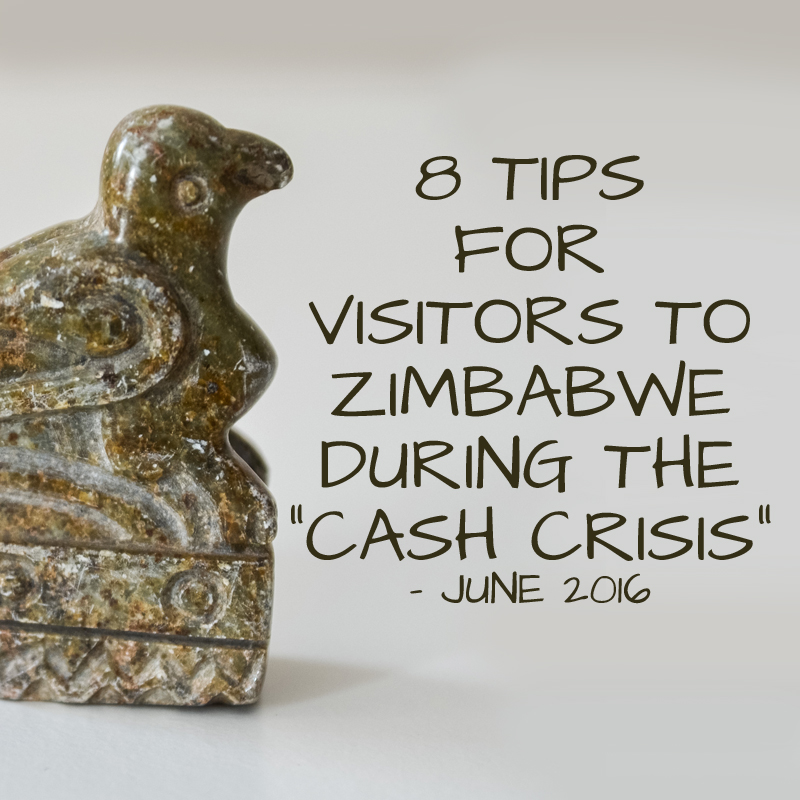
(The below was last updated Oct 2017)
8 tips for visitors to Zimbabwe during the “cash crisis”
If you’re visiting Zimbabwe soon, here are some top tips. Remember that you’re going to Zimbabwe for more than just the wildlife, so adopt the Zimbabwean motto to “make a plan” if you need to. Be flexible and embrace a different way of doing things. Oh, and spare a thought for the Zimbabwean businesses and regular people who have to “make a plan” for longer than a holiday.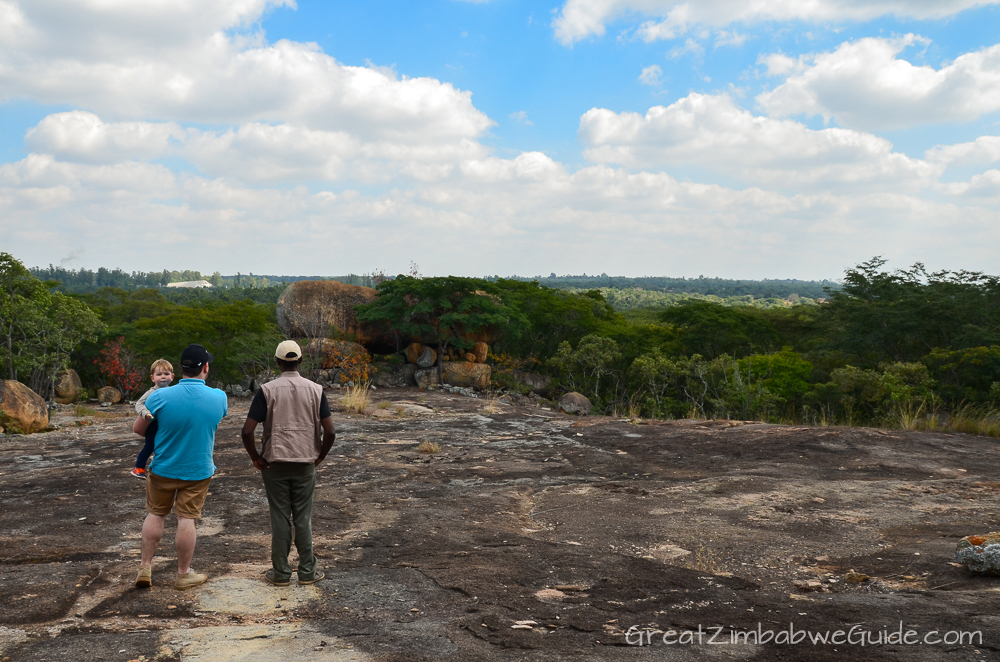
1. Pay before arriving in Zimbabwe (as far as possible)
If you can, pay for your accommodation, activities and transfers now, before you get to Zimbabwe. Email your lodge or tour operator and ask for their accepted advance payment methods before you book, so that you can check you’re happy with the options. An international bank transfer may incur a fee, but in my opinion it is preferable to pay a bit extra and have the peace of your mind knowing that aspect of your holiday is already paid for. Some lodges use specific online payment methods, so use your common sense if they suggest an unfamiliar or unprotected payment method.
If you’re booking through a tour operator local to you, chances are that you’ll have to pay in your home currency before you travel anyway, so this point’s an easy one for you (see a list of tour operators here which is not exhaustive).
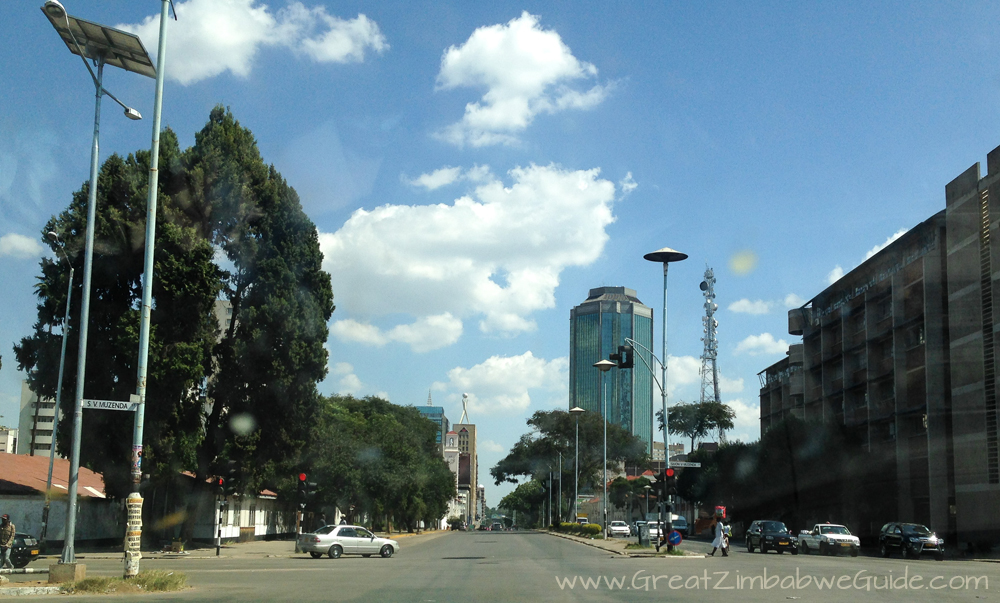
2. Don’t assume you will be able to use your bank card in Zimbabwe
Due to the cash situation, banks in Zimbabwe have put restrictions on withdrawals. Cash machines are currently only allowing small daily cash withdrawals, usually to card-holding customers of that bank only. Until recently, foreigners could use their Visa cards to withdraw cash, but this has been restricted in 2016-2017. In tourist hubs like Victoria Falls, cash withdrawal may still be possible, but don’t expect this to be the norm. Travellers’ Cheques are not accepted.
Certain safari lodges, restaurants and tour operators do accept credit cards and debit cards such as Visa and Mastercard, so this could be a payment option within the country – but ensure you’ve emailed the business in advance to check this first. Some car hire companies, cafes and small restaurants have “swipe” machines for international cards, but this isn’t a given.
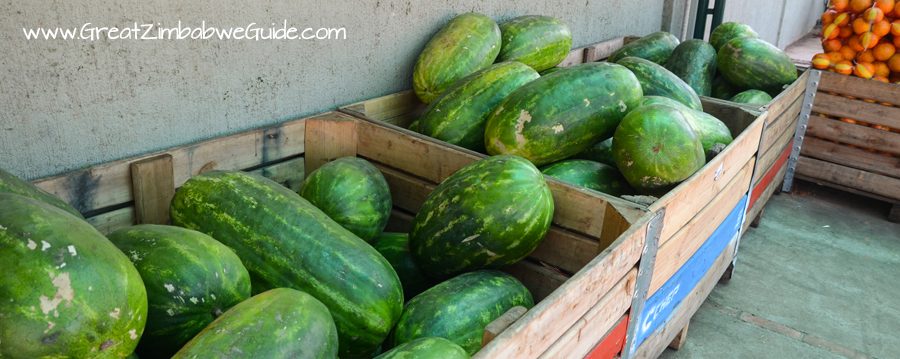
3. Make a budget to ensure you bring enough cash with you (see point #2)
Ask in advance: Ask your tour operator or accommodation provider for a suggested list of things that you may need to pay for when you’re in Zimbabwe, such as National Parks fees, meals, drinks, transport, tips, etc. Specifically, ask if you will need cash for each of these, or if you can pay using your specified international bank card when you’re there.
Tot it up: Write up a rough budget to help you plan for how much cash in US Dollars or Rands you’ll need to take with you into Zimbabwe. As always, take a little bit extra just in case. Prices in shops, etc, are usually quoted in US Dollars, but you can pay the equivalent in Rands or Pula (often to a bad exchange rate as it’s rounded off, so it’s easier to use Dollars).
Visa and toll fees: Most visitors get a visa upon arrival in Zimbabwe (click on the link for full info), and for that, you will need US Dollars cash, so remember to include this in your budget. If you’re self-driving, extra cash will be needed to pay toll fees and fines (see the Driving in Zimbabwe post).
Try to keep cash amounts lower than $2000: Also remember that there are restrictions on the amount of cash that you’re allowed to take out of Zimbabwe at the end of your trip – see the last point at the bottom of this page for advice on this.
4. Take small denominations of cash
It will be difficult to get change in US Dollars if you use, for example, a $100 bill. The solution to this is to avoid notes of denominations larger than $20 as far as possible. In Zimbabwe, $1 notes are useful for tipping and at road toll gates. $2 are still accepted, despite not being used in USA. $5, $10 and $20 notes are useful in cafes and restaurants. If you use an independent taxi or are using National Parks facilities, you’ll need cash.
If paying for your visa fee on arrival in Zimbabwe, life will be easier if you have the exact change to hand. So, for British citizens, have the notes ready for the single entry fee of US$55.
The only exception to the small denomination rule is if you absolutely have to pay for your accommodation or activities in cash. For these, you can take large denomination notes and use them for this express purpose.
You may be given change in the form of Bond Notes (which are officially the equivalent of US Dollars). If you are given Bond Notes in change, try to spend them first on your next purchase.
Rough food prices, Harare, August 2017: Cappuccino $2; Slice of cake $3; Burger with fries and salad $11; Pizza $12; Rump steak (250g) with chips $16.
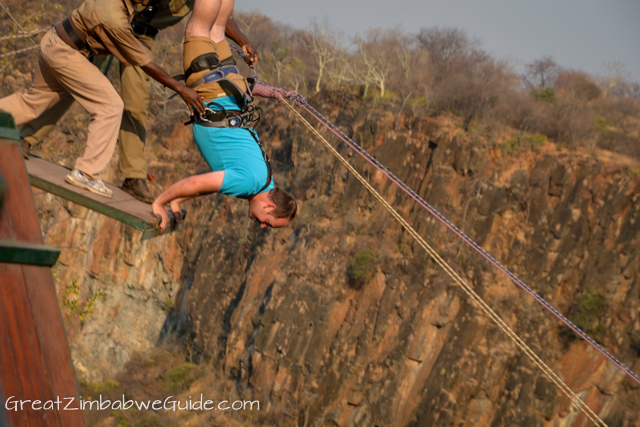
“Should I carry cash on my person at all times?” Maybe not during the gorge swing.
5. Don’t flaunt your cash
As with any tourist destination, don’t be careless with your cash. Keep it safe and be sensible. Everyone has differing opinions on whether it’s better to carry cash on you or to keep it in your hotel room, but this depends on a huge range of factors. If you’re staying in a high-end safari lodge and going on action-packed activities every day it would be unnecessary to take your cash with you, but if you’re staying at a rough-n-ready B&B then it may not be wise to leave cash in your room.
If you’ve followed Point #1 and have paid for almost everything up front, you won’t have large volumes of cash with you anyway, so walking around with money carefully kept on your person won’t be a big worry. Crime is not as bad in Zimbabwe as in South Africa, so it’s not something to be anxious about, but be wise with your money and keep it in an over-the-shoulder bag or in a safe in your hotel. See more tips on staying safe in Zimbabwe.

6. Keep communicating with your accommodation provider or safari operator
Stay in touch with the professionals: send an email to your lodge in Zimbabwe or local safari operator ahead of time to ask questions. They are the ones who are looking after people like you every day, and they are in touch with what’s happening on the ground.
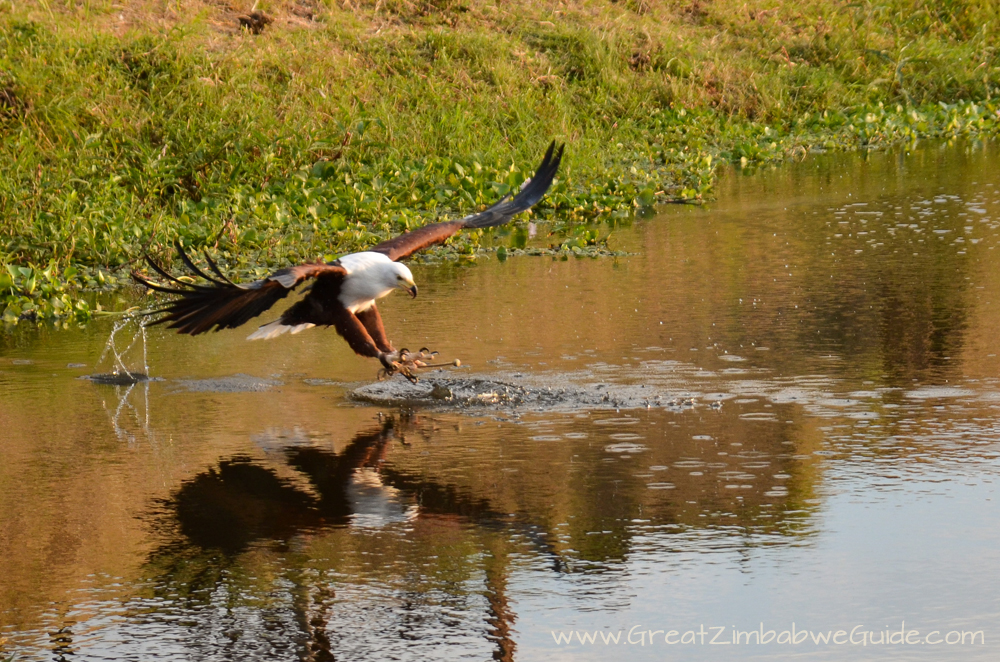
7. Remember the bigger picture
If you have to think outside the box for your Zimbabwe holiday planning, embrace it! Zimbabwe has a way of taking your expectations and throwing them out the window, only to teach you something much more profound and valuable. With a little bit of common sense and an open mind, the “cash crisis” will be just another memorable thread in your holiday of a lifetime.
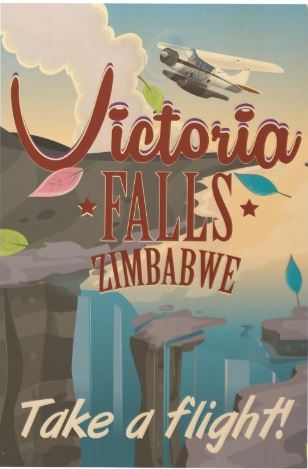
Vintage Poster. Artist unknown.
8. Leaving Zimbabwe with more than $2000 cash?
If you’ve massively underspent during your holiday (or are holidaying in another country afterwards), remember that you aren’t allowed to exit Zimbabwe with cash of more than US $2000 unless you completed a blue Baggage Declaration Form (47) when you entered the country (see details in this August 2017 article from RBZ).
If you do plan on taking more than US $2000 out of Zimbabwe, you will need to do the following: When arriving in Zimbabwe, go to Customs (red route), declare your cash in the blue Form 47 provided, and keep this form safe to display it to officials when departing Zimbabwe. (To see details of this form, you can view the PDF online by Googling “Zimra Form 47“).
If you enter the country with less than US $2000, and you don’t anticipate taking more than $2000 amount out the country, then you don’t need to use a special form to declare your cash. You can just write the amount of cash in the regular Immigration Declaration Form upon arrival in Zimbabwe. Read more: Zimbabwe visa requirements.
Background: The US Dollar has been the primary currency in Zimbabwe since 2009 when the Zimbabwe Dollar crashed. However, due to a number of factors, the US Dollars are becoming scarce. In early May 2016 the Reserve Bank of Zimbabwe (RBZ) announced that it would introduce “Bond Notes” to circulate alongside the existing currencies in Zimbabwe. As you can imagine, when the RBZ Governor made the announcement about Bond Notes, people panicked and started withdrawing cash in haste. As a result of the cash exodus, the banks had to introduce daily withdrawal limits, which fuelled more panic, more cash withdrawals, and more shortage of cash. The Zimbabwean published their take on Bond Notes here, and you can read excellent pieces on the cash situation in this Nehanda Radio article and this Daily Maverick article. Bond coins have been in circulation since 2014, and they are used to give change for amounts less than US $1.
Update: I visited Zimbabwe in August 2017 and you can read my article describing what the cash situation was like at that time.

Supermarkets are still well stocked with local and imported goods in main cities, such as this one in Harare. Photo taken April 2016.
You might be interested in reading ‘When Money Destroys Nations: How Hyperinflation Ruined Zimbabwe, How Ordinary People Survived, and Warnings for Nations that Print Money‘ by Haslam and Lamberti.





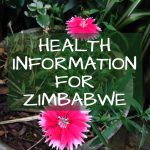

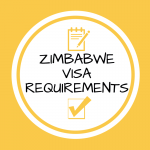
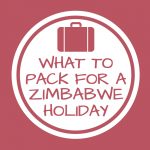
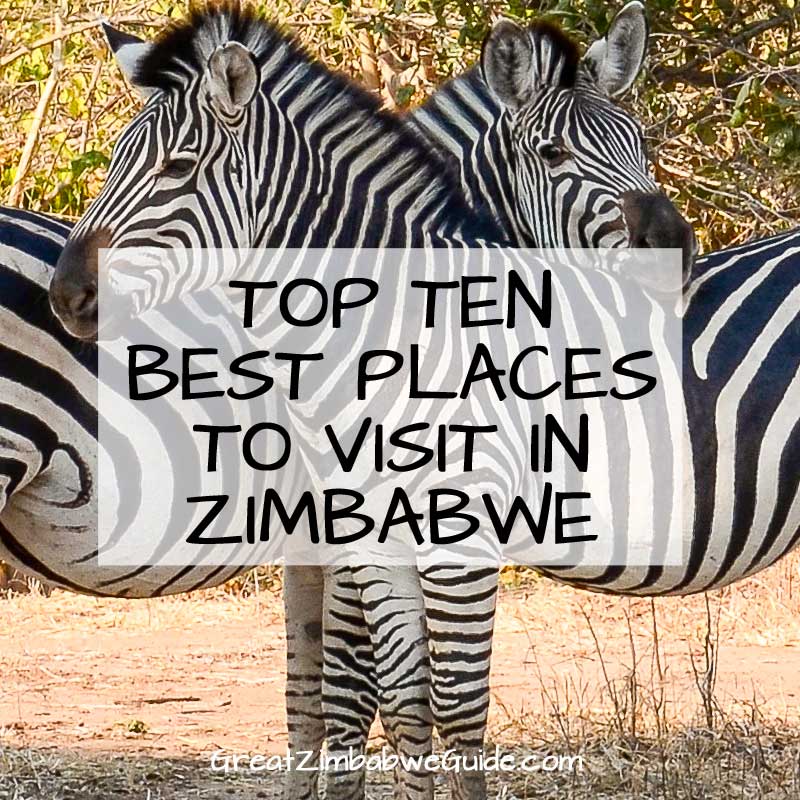
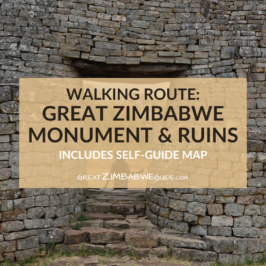
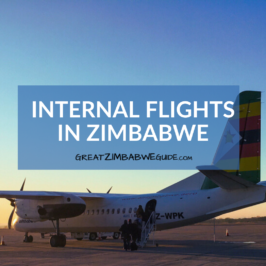
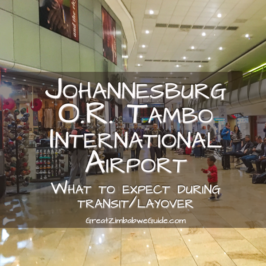
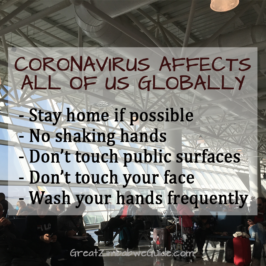
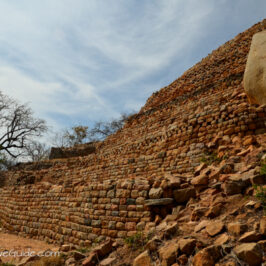
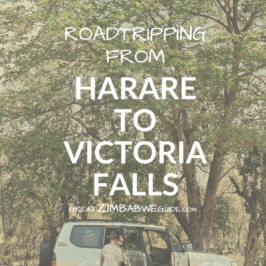

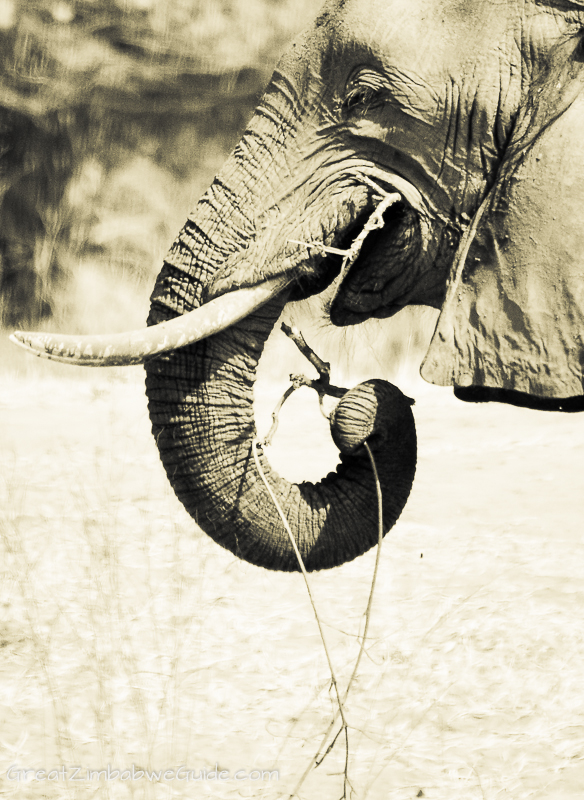
Laptop
That is definitely worth it to read, You might be a quite professional doodlekit.. Laptop We have joined up with your rss and appear forward to in search of even more of ones wonderful posting. Additionally, I’ve got embraced your internet site at my social networking sites
Stephan Strydom
what about the police road blocks almost every 20 km you need cash there as well 20 to 50 $ a shot
GreatZimbabweGuide
Hi Stephan, that’s a good point! I think I’ll mention it and link to the “Driving in Zimbabwe” page (https://www.greatzimbabweguide.com/driving-in-zimbabwe/), as it is only relevant to those who are self-driving. Thanks.
Kira
So if you bring in less than $1000, do you still have to declare it on a blue form or can you just have the white form?also do you know have to declare valuables such as cameras?
GreatZimbabweGuide
Hi Kira, if you bring in less than $1000 you don’t need to declare it. The white form is for immigration only.
Here are some details from the blue customs form 47 about cameras:
“B. Tourist Rebate
1) Who is a tourist?
A tourist is any person who is not a resident of Zimbabwe but travels to Zimbabwe for
business or pleasure for a period of time specified at the time of his or her arrival.
2) What is a tourist rebate?
It is an allowance granted on goods imported by a tourist for his /her own use and not for
disposal in Zimbabwe and which will be re-exported from Zimbabwe at the end of his/her
stay; for example, cameras, laptops, binoculars, cell phones, sports goods (e.g. golf clubs,
soccer kits, balls) musical instruments, business equipment, motor vehicles, boats, and
caravans, camping equipment etc.”
… This indicates that tourists can bring cameras into Zimbabwe for their use while they are temporarily in the country, and that they don’t need to declare cameras.
You can Google Zimra Form 47 for full details. Thanks, Beth
GreatZimbabweGuide
Thanks everyone for your comments! Regarding the amount of cash you can bring in and take out of Zimbabwe, here is an article from Zimra which outlines the restrictions on this. I have now added this link into the article above. http://www.zimra.co.zw/index.php?option=com_content&view=article&id=2372:importation-and-exportation-of-currency-by-travellers&catid=21:did-you-know&Itemid=91
NIKOLINA KOBALI
great article – well done !!
Kaja
Visitors are only permitted to take out $1000 UNLESS they have declared their currency on arrival, then they are permitted to take out up to the same amount.
Allan Harris
One thing you have not mentioned is that if a Tourist declares the amount of currency that they are holding on entry exceeds $1000 they can legally take out what they brought in
Will
With the latest bill to make it illegal to carry more than $200 in cash this makes it impossible for a tourist to be on the right side of the law, and open to the usual tricks of the authorities.